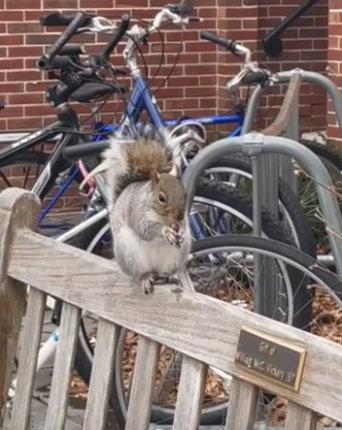Amherst STEM Network x The Student: Squirrel Smarts
Nora Lowe ’26 dives into the clever but enigmatic mind of the Eastern gray squirrel in this week’s Amherst STEM Network x The Student: Are gray squirrels smart because they adapt, or do they adapt because they’re smart?

If you’ve ever come face-to-face with a squirrel eyeing your granola bar on the First-Year Quad, you’re no stranger to the rodent’s cleverness. Eastern gray squirrels (Sciurus carolinensis) are considered an invasive species in certain places, like when they set up camp in African and European countries. But they truly hail from North America. And believe it or not, gray squirrels have great memories — because they stash nuts all across their territory and have to recall where to retrieve them in order to survive. They show signs of learning when completing simple brain teasers and can even remember how to solve them months later.
These impressive feats beg an important ecological question: Do these animals have enhanced problem-solving performance because they must constantly adjust to unfamiliar environments, or can their talents be chalked up to intrinsic characteristics? In other words, is their impressive performance due to nature or nurture?
A study published in Frontiers in Ecology and Evolution documents how researchers from Germany, the United Kingdom, and the United States dug deeper into this question. The researchers started by using historical and genetic records to hunt down founding gray squirrel populations in Cambridge and Cambridgeshire, the places where the squirrels originated after traveling overseas. They also looked at New Jersey and Pennsylvania squirrels to represent a native population. These two non-native and native populations were further subdivided into urban and rural groups, yielding four total groups for the study: native rural, native urban, non-native rural, and non-native urban. Sixty-six squirrels participated overall.
A “mark-recapture” method was used, meaning the researchers analyzed video footage to pick out unique markings and bodily features that distinguish the squirrels from one another. The study performed three intelligence-related tests on all four groups to measure innovation, recollection, and spatial learning abilities. These assessments relied on contraptions involving plastic containers, levers, and edible rewards. Hazelnut kernels were used to attract squirrels to the test sites, and participation was completely voluntary — which ensured the squirrels weren’t too squirrely about getting involved.
In the end, all four groups had similar results across the three tests, so the researchers concluded that enhanced cognition is a “pre-adaptive phenotypic trait” in gray squirrels. Simply put, inherent characteristics increase their fitness (chances of surviving and finding a mate) and make them more competitive against other species and other less fit squirrels, given that there are limited resources.
There were a few notable differences among the groups, though. Compared to their non-native counterparts, native urban squirrels were more successful at solving the trickier of the two brain-teasers (meant to measure innovation) on their very first try (around 70 percent versus around 30 percent success rate). This might have to do with persistence, or whether the squirrels were willing to go through trial and error (maybe the snack was too tempting to pass up). The researchers also suggest that it might relate to differing degrees of readiness to take advantage of new resources, or neophobia, the fear of new things.
But the native urban squirrels took longer than non-native rural squirrels to remember how to solve the tricky innovation problem 25 days later. Though the native urban squirrels showed signs of learning when encountering the same problem for a second time.
“These findings bring insights in understanding the mechanisms that facilitate some species adapting to new environments, and why some species thrive or decline,” said Dr. Pizza Ka Yee Chow, psychology lecturer at the University of Chester and the University of London, and the study’s corresponding author.
So, have gray squirrels conquered many countries because of their natural problem-solving abilities, or is it their invasive nature that makes them so smart? The verdict: it’s mostly due to innate characteristics, but perhaps their squirrel smarts are heightened a touch when acclimating to new environments.





Comments ()